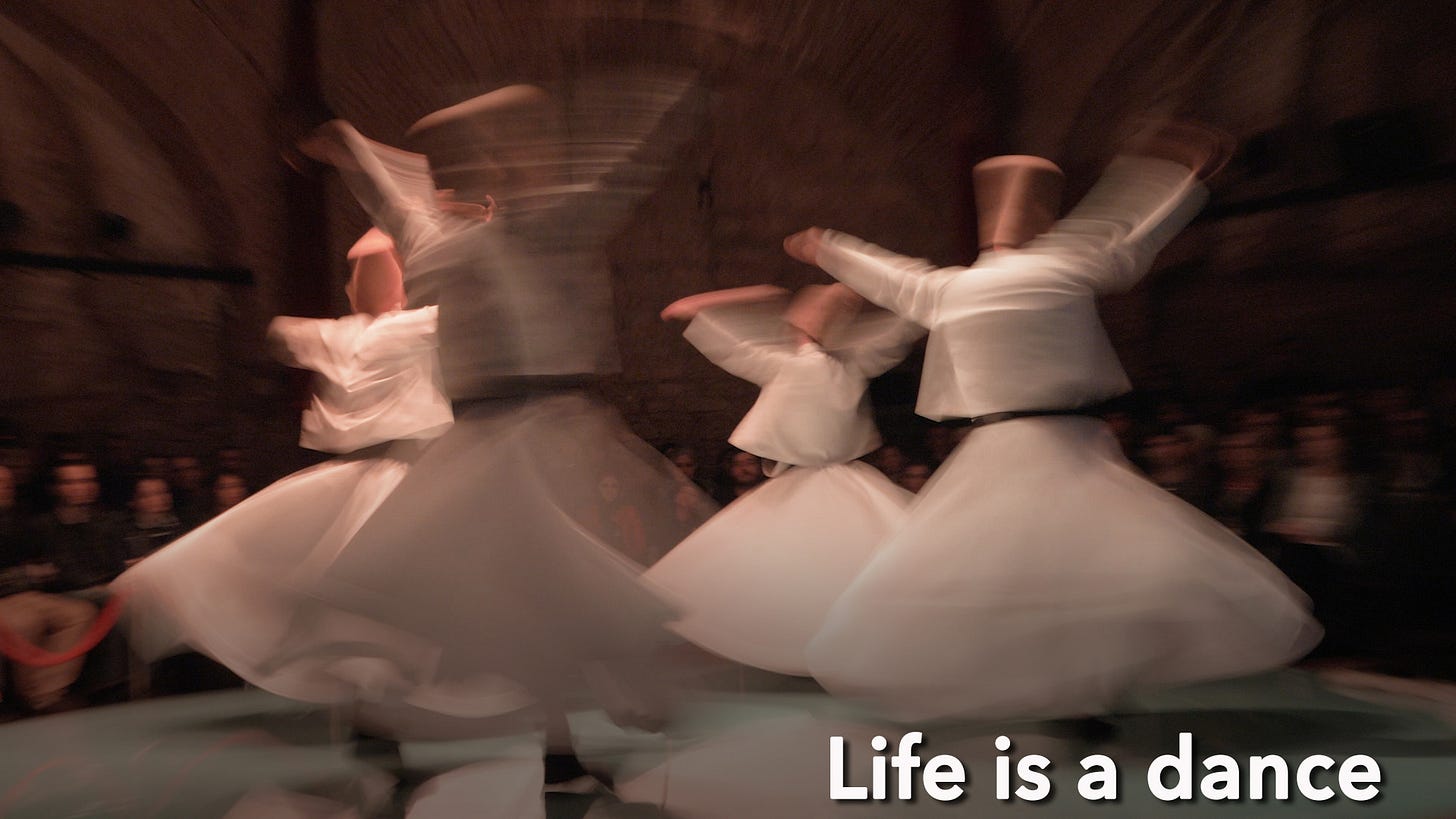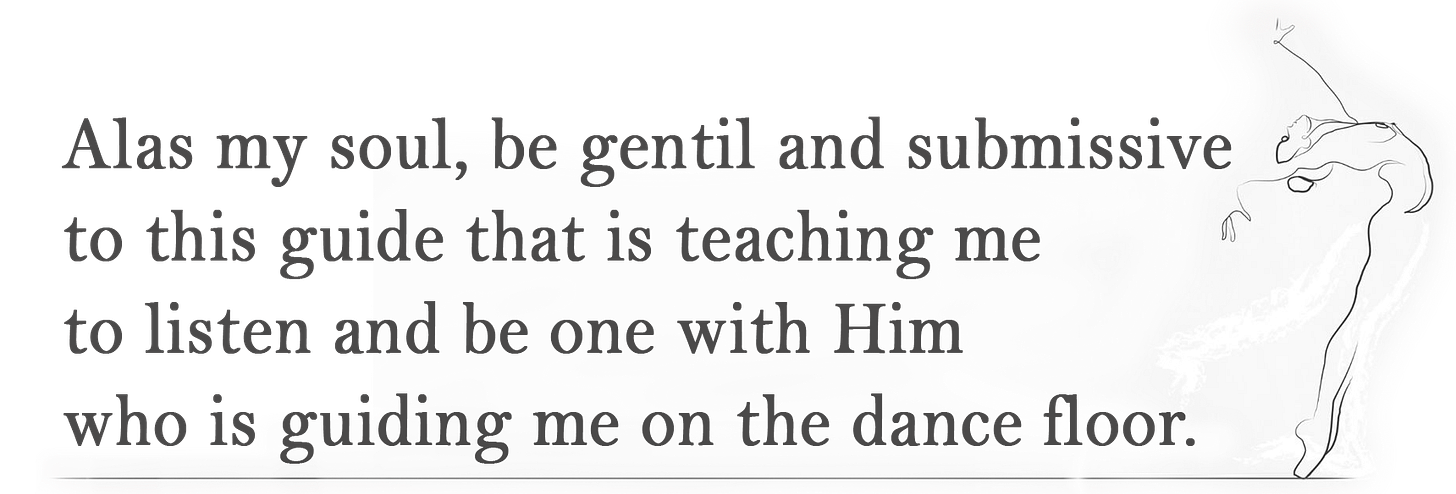There is a rub about life, it is a dance between our inner Self and Life. We move as best we can to keep up with the beat to not make a mess of the dance. But who are we dancing with? At first, we seem to dance with pain, adversity and conflict. All that we encounter in life that challenges our best intentions to make something out of the whole journey of life from childhood to old age. Sometimes we recognize we don’t dance well, others we just want to stop and not dance. But we realize it is worse, it hurts more.
We summon our courage and try to keep up with the music. We have this insight that when the music stops, there will be no more time left and then we may say to ourselves, why didn’t I try to learn to dance better?
Hopefully, down the line something happens, a lucky break. We may be confronted by a hard blow or something that brings us to our knees. If we take accountability for it, eventually something happens, we realize that we weren’t dancing with pain, or adversity, or opposition, or all that took the flavor out of life… we were dancing with the Lord of Being Himself. He is doing his best to guide us to the beat, like a good dancing partner would. It is us that don’t allow Him to guide us through.
In the long run, I have learned that the music and the partner that leads are one and the same.
…a parenthesis: [Whirling Dervishes]
I don’t know if you have ever had the experience to dance Whirling Dervishes. As you become dizzy, somehow a rapture takes over and lifts your experience to a new level of perception and connection with the music and with yourself.
When you finish dancing, there is a presence of silence that engulfs you in soft gratitude.
If I could have my way
I would love You without measure
I would use my waking time
to align all my energy towards You.
However, I’ve learned
that I don’t command
the sail of my ship.
Great is my loss.
Alas my Soul
wake up and be alert!
You are missing out on Life
You are living in a dream.
I pray to a Star
look upon the sky
high above my head
and beg the Spirit for the strength.
My Soul, be brave
My flesh knows deep inside
that I have asked for the worst
to befall me… so be alert.
Because to live beyond
the sleeping time
I must wake up
and assume that I am whole… somewhere.
How else would I love You without measure?
I am little… and accepting it
trespasses the boundary of my homeland
and I overflow to your Realm.
…Oh my true God!
You are my Home
Oh the I AM
Now I know that in this life
I am called to dance with Thee.
Today I share another Zen story[1]. Satori is fickle, it is however an open door we encounter in front of us, but few have chosen to enter. Some have not crossed it because there is just too much noise inside them and it closes without them ever knowing it was open. Others because they haven’t seen it; the weight they carry is just too great to bear and distracts all their attention. But I believe we have all been in front of the door to enlightenment, just because we are human, mostly because we are conscious (even though some may not seem like it). You see, enlightenment is to consciousness as water is to thirst, what purpose would thirst serve without water?
The Lost Ronin[2]
There came to pass a Ronin roomed in a small province of medieval Japan after his lord was killed in the Shogun War. He was a drifter and did not unite with other Ronin. He hadn’t eaten in two days and had caught a fair size fish on a riverbank and was preparing the fire to cook it. While he was not looking, a large wild cat took his lunch, and while attempting to run away with his catch in its mouth, the warrior drew his katana and with a swift blow cut the wild cat in two.
All became silent. The Ronin stood immovable after the strike. Then a thought entered his mind, “how could you have killed this magnificent animal?” He was troubled and vexed. As the days and nights passed on, he began to hear the growl of the cat in his head. This tormented him. He could not sleep, nor could he be at peace to meditate or do anything.
The Ronin stopped caring for himself, he didn’t comb his hair, nor tended his clothes. He began to sit at the entrances of towns, and some gave the beggar something out of pity.
One day a wise monk came to town and saw the Ronin. He gave him water and rice he had for himself. He then took him to his hermitage. The next day he asked him what was wrong. The Ronin explained what he had done to the wild cat, how he was tormented by the growl of the animal in his head. How he could not sleep nor have any peace because of the torturing sound.
After a short silence, the monk said in a loud-recriminating tone,
– How could you have fallen so low? You are a Samurai – followed by – You have no other choice but to do seppuku.
The Ronin looked down with shame.
Seppuku, also known in the west as hara-kiri, is a ritual suicide. You see, in Japanese warrior culture, honor is more important than life (as it should be). Samurai will live by a code of honor and self-respect, and staying true to one’s own principles was the highest standard. Violate that, and the only honorable act is seppuku.
– Tomorrow morning at dawn you will do seppuku. I will show you mercy and will be your kaishakunin – said the monk with the utmost matter-of-fact tone.
The Seppuku ritual is gruesome to us westerners, the subject starts with a ritual ceremony, recites a “poem of death” and drinks sake before stabbing himself with a small blade on the left-hand side of the belly and slicing to the right and then up to ensure a deadly wound. Then the kaishakunin will sever his head from his body with a swift strike of a katana.
The monk allowed the Ronin to sleep in his cell, left paper and an ink pen to write the poem. In the early morning before sunrise, the monk softly knocked on the door and gave the Ronin a white garment for the ritual.
It was completely dark and the Ronin came dressed in white. He walked towards the front of an open space lit by a candle, a white linen cloth on the ground with a cup of sake and his short blade.
The Ronin stopped in front of the laid cloth and bowed. He sat on the ground in a Seiza position. He took the sheet of paper out of his kimono and read the poem without a shred of emotion. He sat the paper next to him and took a small linen cloth and very meticulously folded it and took with it the blade. With a firm movement, he opened the left-hand side of the kimono to expose his abdomen. Slowly he placed the sharp end of the blade against his side. He closed his eyes and made a silent prayer. Then he pressed the blade with determination, when he heard a whisper in his right ear…
– Can you still hear the growl of the cat? – said the monk softly. After a moment of silence checking in his mind, the Ronin replied – No I cannot. – Then you do not have to do seppuku.
Photo Crosswalk.
[1] The first Zen story I shared was The Downside of Up! LINK
[2] Ronin: rōnin [Japanese] meaning 'drifter' or 'wanderer', was the name given to a samurai without a lord or master during the feudal period of Japan (1185–1868). A samurai became masterless upon the death of his master or after the loss of his master's favor or privilege. https://en.wikipedia.org/wiki/R%C5%8Dnin









